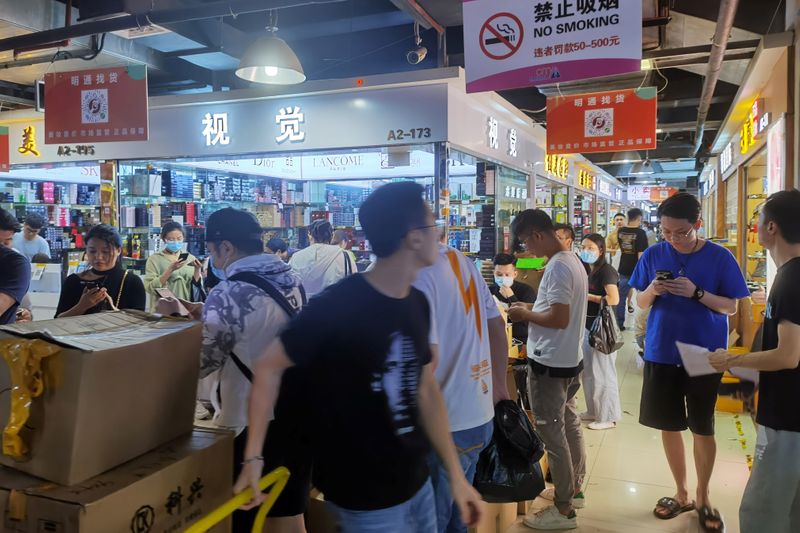By David Kirton
SHENZHEN, China (Reuters) - It's 10 p.m. in the world's largest electronics market, and lines of delivery workers who once hauled computer components and knock-off phones now push carts overflowing with Mac lipsticks, Bioderma cleansers and other foreign beauty brands.
The electronics sellers for which Huaqiangbei is famous have mostly gone home, but the wholesale cosmetics merchants crammed into 1,400 stalls in the sprawling market's Mingtong mall will be working until 2 a.m. to meet booming demand.
"It doesn't matter what promotions are happening, it's this busy every night," a seller surnamed Ying said on a recent weeknight.
Ying opened her cosmetics stall three months ago, part of a sudden makeover at the landmark electronics market in this famously entrepreneurial city.
Huaqiangbei is home to dozens of multistorey malls housing about 38,000 businesses that historically sold microchip reels and other components. It is also a matchmaking hub for global companies looking to get things made in nearby factories.
But rents are rising as its once-unruly markets gentrify, with increasingly upscale malls and 5G "experience centres" now lining its tidied roads, reflecting Shenzhen's upward mobility from a manufacturing and trading hub to what China sees as the sleek and prosperous equivalent of Silicon Valley.
Where many of the market's stalls once sold knock-off Apple (NASDAQ:AAPL) and Samsung (LON:0593xq) products, vendors have been squeezed by affordable local brands like Xiaomi and Vivo and stricter IP laws. For many, the easiest move was to get out of electronics altogether.
"We used to just sell phone parts, but by 2016 some of the markets were 50% vacant, so we needed to try something else to survive," said Lin Muxu, general manager of the Mingtong Digital City market, who has worked in Huaqiangbei for 15 years. "We saw there's great demand for beauty products, whether it's teenagers, women, men in their 60s and 70s."
THE BEAUTY OF BEAUTY
Chinese consumers have a growing appetite for cosmetics, with sales worth 256.9 billion yuan (29.52 billion pounds) from January to October, up an annual 5.9%, official data show. In the same period, overall retail sales dropped 5.9%.
Although Mingtong had hosted a smattering of cosmetics dealers for several years, the business took off this year when border closures halted the flow of traders going to Hong Kong and picking up tax-free goods for resale, several wholesalers said.
"For importers with the right licenses, we can buy in bulk here and sell products at a few cents' markup each," said a trader named Scott, declining to give his full name, worried he would get in trouble with security staff for speaking to a journalist.
"It's a bit of a gray area," he said, noting that not all sellers declare their imported goods or go through proper channels.
Some buyers at the market purchase items in small batches to sell on Chinese e-commerce sites such as Alibaba (NYSE:BABA)'s Taobao.
"It's a few at a time, but we're moving such volumes that there's a good profit to be made," Scott said.
Seller Eva Zhou said all her European cosmetics were genuine, though near the end of their shelf lives. She worries that as more sellers flock to the market, margins will be squeezed further.
"I think a lot of people have lost their jobs with the virus, and now there's good money to be had here, but it won't work if everyone is doing it," she said.
(1 British pound = 8.7017 Chinese yuan renminbi)
